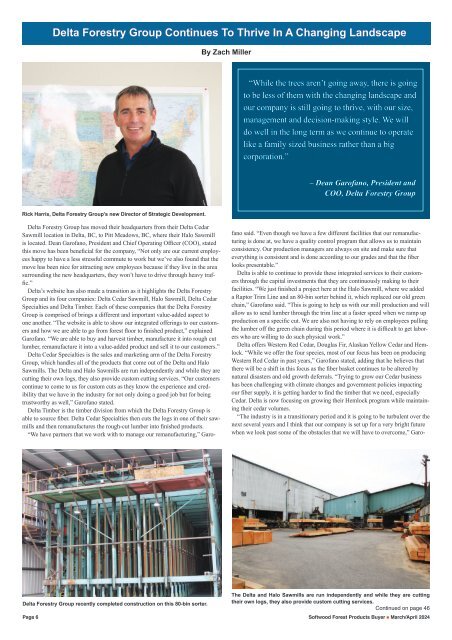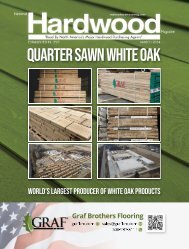The Softwood Forest Products Buyer - March/April 2024
Get the latest softwood industry news in the Softwood Forest Products Buyer! This issue features stories on the FenceTech 2024 convention, the NAHB International Builders' Show and the NKBA Kitchen & Bath Show, Prime Lumber Products, lumber shipping trends and much more.
Get the latest softwood industry news in the Softwood Forest Products Buyer! This issue features stories on the FenceTech 2024 convention, the NAHB International Builders' Show and the NKBA Kitchen & Bath Show, Prime Lumber Products, lumber shipping trends and much more.
Create successful ePaper yourself
Turn your PDF publications into a flip-book with our unique Google optimized e-Paper software.
Delta <strong>Forest</strong>ry Group Continues To Thrive In A Changing Landscape<br />
Lumber Shipping Companies Are Cautiously Optimistic As Traditional Trends Return<br />
By Zach Miller<br />
“While the trees aren’t going away, there is going<br />
to be less of them with the changing landscape and<br />
our company is still going to thrive, with our size,<br />
management and decision-making style. We will<br />
do well in the long term as we continue to operate<br />
like a family sized business rather than a big<br />
corporation.”<br />
– Dean Garofano, President and<br />
COO, Delta <strong>Forest</strong>ry Group<br />
Lumber shipping companies saw that their trends year over year have begun<br />
to revert back to how traditional markets have been in the past, but they hold a<br />
cautious optimism as geopolitical factors can easily affect the supply chain strategies.<br />
One shipper noted, “We slowly saw the industry normalize over the last 12<br />
months and it is back to pre-pandemic levels. I do not foresee any substantial<br />
increases in our export shipments over the next 12 months.”<br />
Despite seeing their markets slowly return to the traditional trends, a lumber<br />
shipper remarked, “Asking me to predict shipping volumes in the first quarter of<br />
<strong>2024</strong> is akin to throwing spaghetti at the wall and seeing ‘what sticks.’”<br />
A shipper stated, “<strong>The</strong> only constant across all industries is that margins are<br />
being squeezed. Going into the New Year, we can all be hopeful that the economy<br />
starts to pick back up, but I am not sure that is what we will see.”<br />
<strong>The</strong> October figure was still 15 percentage points below 2019 levels, and with no<br />
sign of improvement since May, according to Sea-Intelligence Maritime Analysis.<br />
To manage the impact of overcapacity primarily driven by the influx of newly<br />
ordered vessels entering the market, carriers are pulling out all the tricks to absorb<br />
capacity. <strong>The</strong>y have many tools at their disposal, whether it’s blank sailings,<br />
cancelling or suspending entire service loops, further slow steaming, laying up<br />
ships or taking longer routes. While all that will combine to help carriers weather<br />
a rough patch of unfavorable supply-demand economics, it undermines schedule<br />
integrity and service reliability.<br />
<strong>The</strong> disruptions caused by the COVID-19 pandemic highlighted the fragility of<br />
global supply chains. In response, the ocean transportation industry is focusing<br />
on building resilience. This involves diversifying supply chain sources, adopting<br />
agile logistics strategies, and investing in redundant systems to mitigate risks and<br />
ensure the uninterrupted flow of goods. <strong>The</strong> maritime industry is embracing digitalization<br />
at an unprecedented pace. From smart containers with real-time tracking<br />
capabilities to blockchain-based documentation, technology is streamlining operations,<br />
reducing inefficiencies, and enhancing overall transparency.<br />
2023 was also marked by longshore labor disruption. <strong>The</strong> International Longshore<br />
and Warehouse Union (ILWU) flexed<br />
Continued on page 38<br />
Rick Harris, Delta <strong>Forest</strong>ry Group’s new Director of Strategic Development.<br />
Delta <strong>Forest</strong>ry Group has moved their headquarters from their Delta Cedar<br />
Sawmill location in Delta, BC, to Pitt Meadows, BC, where their Halo Sawmill<br />
is located. Dean Garofano, President and Chief Operating Officer (COO), stated<br />
this move has been beneficial for the company, “Not only are our current employees<br />
happy to have a less stressful commute to work but we’ve also found that the<br />
move has been nice for attracting new employees because if they live in the area<br />
surrounding the new headquarters, they won’t have to drive through heavy traffic.”<br />
Delta’s website has also made a transition as it highlights the Delta <strong>Forest</strong>ry<br />
Group and its four companies: Delta Cedar Sawmill, Halo Sawmill, Delta Cedar<br />
Specialties and Delta Timber. Each of these companies that the Delta <strong>Forest</strong>ry<br />
Group is comprised of brings a different and important value-added aspect to<br />
one another. “<strong>The</strong> website is able to show our integrated offerings to our customers<br />
and how we are able to go from forest floor to finished product,” explained<br />
Garofano. “We are able to buy and harvest timber, manufacture it into rough cut<br />
lumber, remanufacture it into a value-added product and sell it to our customers.”<br />
Delta Cedar Specialties is the sales and marketing arm of the Delta <strong>Forest</strong>ry<br />
Group, which handles all of the products that come out of the Delta and Halo<br />
Sawmills. <strong>The</strong> Delta and Halo Sawmills are run independently and while they are<br />
cutting their own logs, they also provide custom cutting services. “Our customers<br />
continue to come to us for custom cuts as they know the experience and credibility<br />
that we have in the industry for not only doing a good job but for being<br />
trustworthy as well,” Garofano stated.<br />
Delta Timber is the timber division from which the Delta <strong>Forest</strong>ry Group is<br />
able to source fiber. Delta Cedar Specialties then cuts the logs in one of their sawmills<br />
and then remanufactures the rough-cut lumber into finished products.<br />
“We have partners that we work with to manage our remanufacturing,” Garo-<br />
Delta <strong>Forest</strong>ry Group recently completed construction on this 80-bin sorter.<br />
fano said. “Even though we have a few different facilities that our remanufacturing<br />
is done at, we have a quality control program that allows us to maintain<br />
consistency. Our production managers are always on site and make sure that<br />
everything is consistent and is done according to our grades and that the fiber<br />
looks presentable.”<br />
Delta is able to continue to provide these integrated services to their customers<br />
through the capital investments that they are continuously making to their<br />
facilities. “We just finished a project here at the Halo Sawmill, where we added<br />
a Raptor Trim Line and an 80-bin sorter behind it, which replaced our old green<br />
chain,” Garofano said. “This is going to help us with our mill production and will<br />
allow us to send lumber through the trim line at a faster speed when we ramp up<br />
production on a specific cut. We are also not having to rely on employees pulling<br />
the lumber off the green chain during this period where it is difficult to get laborers<br />
who are willing to do such physical work.”<br />
Delta offers Western Red Cedar, Douglas Fir, Alaskan Yellow Cedar and Hemlock.<br />
“While we offer the four species, most of our focus has been on producing<br />
Western Red Cedar in past years,” Garofano stated, adding that he believes that<br />
there will be a shift in this focus as the fiber basket continues to be altered by<br />
natural disasters and old growth deferrals. “Trying to grow our Cedar business<br />
has been challenging with climate changes and government policies impacting<br />
our fiber supply, it is getting harder to find the timber that we need, especially<br />
Cedar. Delta is now focusing on growing their Hemlock program while maintaining<br />
their cedar volumes.<br />
“<strong>The</strong> industry is in a transitionary period and it is going to be turbulent over the<br />
next several years and I think that our company is set up for a very bright future<br />
when we look past some of the obstacles that we will have to overcome,” Garo-<br />
<strong>The</strong> Delta and Halo Sawmills are run independently and while they are cutting<br />
their own logs, they also provide custom cutting services.<br />
Continued on page 46<br />
DC PREMIER<br />
Appearance<br />
timbers<br />
and 2” dimension<br />
A division of the Delta <strong>Forest</strong>ry Group<br />
Logging - Milling - Finishing<br />
DC SUPERIOR<br />
STK kiln dried<br />
fascia, decking,<br />
siding and<br />
boards<br />
DC SUPREME<br />
STK green<br />
fascia<br />
decking, siding,<br />
and boards<br />
Delta Cedar Specialties<br />
604 589 9006 deltaforestrygroup.com<br />
DC SELECT<br />
std&btr no hole<br />
green decking<br />
and boards<br />
Page 6 <strong>Softwood</strong> <strong>Forest</strong> <strong>Products</strong> <strong>Buyer</strong> • <strong>March</strong>/<strong>April</strong> <strong>2024</strong> <strong>Softwood</strong> <strong>Forest</strong> <strong>Products</strong> <strong>Buyer</strong> • <strong>March</strong>/<strong>April</strong> <strong>2024</strong> Page 7<br />
Peter Lovett<br />
Peter Lovett<br />
King City Forwarding USA, Inc.<br />
Chesapeake, VA<br />
As we sail into <strong>2024</strong>, the ocean<br />
transportation industry is experiencing<br />
a sea change in trends that<br />
are reshaping the way goods are<br />
moved across the globe. <strong>The</strong>se<br />
shifts are not only altering the<br />
dynamics of maritime commerce<br />
but also necessitating innovative<br />
strategies to address supply chain<br />
challenges. I would characterize<br />
2023 as the “correction” year in<br />
the ocean freight market where we<br />
saw significant reductions in export<br />
and import freight rates across all<br />
trades. <strong>The</strong>re was an overall decline<br />
in ocean freight demand globally<br />
caused by a slower economy,<br />
as governments across the world<br />
managed inflation. Overall, the<br />
supply chain experienced better<br />
fluidity in 2023, with the alleviation<br />
of port congestion on the East<br />
and West coast, which resulted in<br />
more reliable shipping schedules.<br />
Even with ports clear of congestion,<br />
service reliability remains<br />
an issue, not having reverted to<br />
pre-COVID levels. Due to overcapacity<br />
and carriers’ aggressive<br />
response, it will likely not return<br />
to normal levels in <strong>2024</strong>. Global<br />
container ship scheduled reliability<br />
stood at 64.4 percent in October, up<br />
from 51.8 percent a year earlier and<br />
approximately 35 percent in 2021.

















